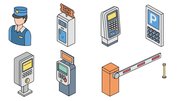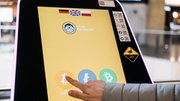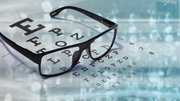Article
Airlines try e-ticketing option
Are mobile devices the next generation of boarding passes?

September 1, 2008
Travis K. Kircher is the editor of SelfService.org, a sister Web site, and is a regular contributor to Kiosk Marketplace. Kircher's most recent kiosk story explored wardrivers and the kiosk.
If the International Air Transport Association has its way, paper boarding passes soon may be a thing of the past as mobile devices such as smart phones and Blackberries become an air traveler's ticket to fly. In October 2007, the IATA, an association of roughly 230 airlines representing 93 percent of scheduled air traffic worldwide, issued a mandate for member airlines to replace all magnetic stripe and one-dimensional barcode ticketing with boarding passes containing two-dimensional barcodes by the end of 2010.
| ||||||||||||||||||||||
The two-dimensional barcodes — which contain information about both the passenger and the scheduled flight — can be read and verified by gate attendants via special handheld scanners. Beyond it being a more cost-effective and efficient means of data storage, two-dimensional barcoding has an additional advantage over the alternatives, according to Eric Leopold, project manager of IATA's Bar Coded Boarding Pass project. Not only can barcodes be scanned from paper tickets, he says, but unlike mag-stripes, they can also be ripped from mobile device displays, effectively turning a passenger's cell phone into a boarding pass. "When you board the aircraft, it will scan the barcode whether it's on the phone or on paper," said Leopold, who said that passengers still will have a paper option.
Getting 'on board' with the technology The IATA mandate has spurred some airlines to investigate the advantages offered by mobile ticketing technology. Already, Leopold says, 151 member airlines have upgraded their software to generate two-dimensional barcodes on paper — and although the mandate doesn't specify that it be transferable to mobile devices yet — the leap in technology is a small one that many airlines might be eager to make. So far, only a dozen or so airlines spread across the globe are trialing the mobile option. In the United States, those include Continental Airlines, Northwest Airlines and Delta Airlines. Internationally, the technology is being explored by Air Canada, British Midland Airways, Japan Airlines, China Southern Airlines and a handful of others. Ronnie Forbes, the founder and chief executive of Mobiqa, is one of mobile-ticketing's staunchest proponents and believes this number will grow. Based in Scotland, Mobiqa provides mobile-ticketing solutions for airlines, railways, cinemas and other venues. Forbes says the IATA's mandate has been a powerful motivation for airlines to get on board with the new technology. "I'd say it's absolutely fundamental," he said. "I'm not sure it would have happened — at least not on much of a scale and certainly not in any short timeframe — without it."
The mobile option Mobiqa is currently partnering with several airlines to provide mobile ticketing, including Northwest, which has been trialing the mobile option on all non-stop flights out of Indianapolis since May. Forbes says Northwest's e-ticketing system is easy to use. When the user books his or her flight, either through a computer or mobile device, the interface asks whether he or she would like to receive the boarding pass on their cell phone. If they say yes, they then have to review a catalog of mobile devices and select the one that matches their handset. Forbes says Mobiqa has patented software that is able to format the barcode to fit a variety of phone types and screen sizes. "Blackberries, iPhones, very small-screened Nokias — there are literally hundreds of different types of mobile phones out there that have different screen sizes," he said. "If we just used a one-size-fits-all barcode with a very high resolution phone like a Blackberry or an iPhone, then the barcode would appear very tiny and wouldn't scan, so we actually have to scale up the barcode based on the mobile-phone screen." The barcode — along with relevant flight information such as the traveler's name, the pertinent gate and the seat number — is later transmitted to the user's mobile device 24 hours before the flight leaves.
Mutual benefit Forbes says the advantages of mobile ticketing, both to the airlines and to the passenger, are obvious. "The whole IATA directive is about cost savings," he said. "They really want to take as many of the passenger processes out of the airport and make them as self-service as possible to save on costs." He points to IATA estimates that indicate each passenger who checks in at the desk costs the airlines $9.00. A passenger who checks in at a kiosk costs $2.50. Mobile ticketing, on the other hand, shifts more of the burden to the consumer, who furnishes both the labor and the technology platform. He said it also frees up more airport space as they won't be waiting in line for the desk or the kiosk. "The more they can encourage self-printing and mobile check-in, the better," he said. Michelle Aguayo-Shannon, a spokeswoman for Northwest Airlines, is quick to point out the value to the consumer, who often has trouble finding a printer, laptop and Internet connection to print out a boarding pass for a return flight. "You're juggling your carry-on bag and your computer bag, and you know you're about ready to go through and have to take off your shoes and your jacket," she said. "You have your ID and everything else. Now you can put so much of it on your Blackberry, and it's right there." Aguayo-Shannon said Northwest is pleased with the results of its mobile ticketing trial and hopes to begin offering the service in Detroit and Minneapolis later this year. "The test phase has gone extremely well," she said. "We've gotten positive feedback from the customers using it and also from the TSA. They're beyond pleased with how this is moving and working. It's just been very advantageous all the way around."
 ChatGPT
ChatGPT Grok
Grok Perplexity
Perplexity Claude
Claude










